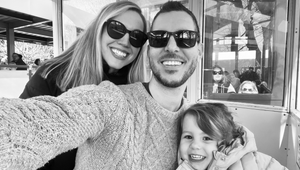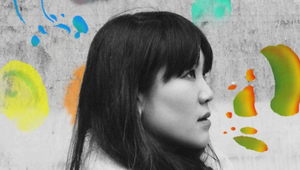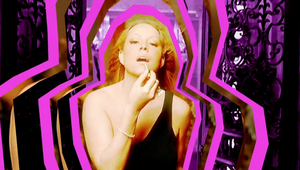
Bonnie MacRae on Authenticity, Womanhood and Taboo

Bonnie MacRae, NERD Productions’ newest and promising live-action director, says she always somehow ‘knew’ she would end up doing something creative. Only at age nine, when the coolest thing ever for little Bonnie was a signed copy of a Jacqueline Wilson book, her mum recognised the creative spark and let her skip school to go to the book signing. Bonnie would proceed to read all of her books and idolise Jacqueline until she was officially put on the pedestal named ‘first person to spark my love for storytelling’.
Not only this, but Bonnie remembers being quite interested in the filmmaking process from a young age too. “The first film I ever made was a stop motion featuring a line-up of my stuffed toys, like a police interrogation. It was a murder mystery with a toy Ms Piggy as the culprit - I’ve always wanted to direct comedy dramas.”
But besides her short stint creating the first ever Toy Story (don’t tell Disney), Bonnie actually ended up doing architecture at university - something she refers to as a ‘rogue choice’ far away from her true love, directing. “I always loved art at school and the idea of doing something that would mean being creative and having a well paying job was why I decided on architecture. I’m not a technical or mathematical person at all, so I got a big wake up call during my first few months of university.” The lesson there was that she wasn’t all that sensible of a person and she ended up being much more tempted by the idea of winging things herself – more of a trial-and-error situation, rather than exact sciences. At the time, Bonnie happened to have an old camera which she would end up spending all her free time playing with – she started taking graduation photos for fellow students, to make some extra cash before realising she could get into gigs for free with a photo pass. That’s how her music photography career started.
“A penniless motivation to get into seeing my favourite musicians turned into a real love for the work,” she says. After a while, Bonnie ended up collaborating with a lot of the bands and artists she went to see, which slowly pushed her onto the path of making music videos. “That’s when the desire to make films really started to grow within me,” she remembers.

One of the experiences Bonnie shares from the start of her career is the realisation that she is from a working-class background. “I never really thought of myself as working class until I left my hometown and went to university,” she says. “I never saw myself as being at a disadvantage, and still don’t completely view it like that. Of course, when you’re thrown into a fairly elitist environment, one so different from what you know to be the norm, it is eye-opening to see people have got on with help from money and family.” At the end of the day however, Bonnie believes that being from a working-class background shouldn’t leave you at a disadvantage when it comes to being successful in the industry. “I think it just means you know the value of everything you achieve, and get really good at asking for help and advice,” she adds. However, Bonnie does admit that she sees a disproportion in the way the industry is split between cities. As somebody living in Scotland, she definitely notices the disparity between the industry there and that in London
And although in a post-pandemic world everything can be remote, there is still ‘this niggling thing at the back of [her] mind’ telling her that she’s missing out by not being ‘at the heart’ of it all. “It would be nice if there was more of an industry here in Scotland, particularly for those deriving from working class backgrounds, where the idea of moving to somewhere like London seems so far away, both financially and geographically!”
Bonnie is a director that creates off the back of personal experiences a lot of the time, so working-class-related themes are not rare in her work. However, she explains that it is an inner battle to understand how much of yourself you choose to ‘give up’, if any, and what part of it will ultimately benefit the work you’re producing. “I don’t think you should create work that is necessarily completely exposing, and of course not everything should be autobiographical.” That said, Bonnie does believe there’s a real upper hand in writing from and being inspired by your own experiences – it’s what you know best, after all. For her, the golden key lies in finding the perfect middle ground, as with many things, between not sacrificing so much of yourself that you strip the skin off your bones, and still showing only that which will benefit your narrative.

That is the fine line Bonnie has been threading throughout her directing career, especially as a person for whom authenticity is paramount to good work. But what is authenticity anyway? “Well, sometimes you watch something that just…strikes you. And sticks with you,” she simply says. This refers to precisely that feeling you get at the end of a film when you’re sitting in the cinema with the credits rolling, and your mind is racing. “You have so many questions, so much to say. That, to me, is when a filmmaker has managed to be successfully authentic. You don’t want it to end.”
So, authenticity and self-exposure seem to be intricately woven together. Referring to her poignant work ‘All Up There’, a short film about the struggles a woman faces when trying to reach an endometriosis diagnosis, she says this is an especially exposing piece. “I toyed with whether or not to include certain things that I have done, but I’m so impassioned by the cause and by just how little this type of chronic illness is spoken about, that I felt like I had to be as honest as possible. For me, I know I’ve been authentic in my own filmmaking when someone from a completely different background or understanding can walk away from something I’ve made and feel impacted by it, regardless of how much they had to do with the subject matter.”
In ‘All Up There’, Bonnie explains she wanted the audience to feel as immersed as possible, in an attempt to open up the world to those who have no experience of life with the condition, as she does. “I know what it feels like to live with it, so I wanted to create something that was representative of that, particularly from a coming-of-age perspective.” She explains that for her, the short is a portrait of youth, womanhood, and medical misogyny, all spun around women’s fight to be heard but also to be understood. “There’s a difference between the two. When you are told time and time again that something is in your head, it’s more than probable that sooner or later, you will start to believe it. When you know in your heart that something is not right, sooner or later, you’ll want to fight back. This film is my way of fighting back.”

Stills from 'All Up There'
This also plays into why Bonnie feels drawn to portraying womanhood in her work, even though she says she doesn’t ‘go out of her way’ to put the focus on women. To her, depicting womanhood is more of a steady strive towards showing people the full picture, telling the whole story – be it the part where women are neglected, not heard, or misunderstood, as they are in ‘All Up There’. “Part of the success in the female-led stories I love is the focus on complexities, the parts that all of us can relate to in some way. It’s important when prioritising storytelling around womanhood that it feels representative and truthful. I want to write and direct work that features strong women at the helm, but also ensure I prioritise their pitfalls and weaknesses – what makes them strong in the first place,” explains Bonnie.
And although some might think the themes in her work verge on taboo, to her they shouldn’t be, and that’s why she is talking about them. “Taboo is a societal label put on topics that people find too difficult to address. I’m really just interested in telling the stories that, maybe selfishly, I know I can relate to. I’m drawn to work that impacts people emotionally, one way or another, and that is something I think every filmmaker strives to achieve.”
A subject close in difficulty was the one she picked apart in ‘Mind Yersel’, a film about the remarkably high male suicide rates in Dundee. “I wanted the audience to hear what it feels like from the voices themselves, to see the faces of those it affects,” Bonnie says. In the film, she cast people with a traditional Dundee accent, which is not often heard on screen. Bonnie refers to ‘Mind Yersel’ as also one of the toughest projects of her career, as it was made overnight without a budget, or big plan and production. “More so once the film was released online and it gained a lot of traction overnight. It represents real people, and I feel such an overwhelming sense of worry if I had said the right things and done everybody justice in the film,” she explains.
On the lighter side of things, besides breaking societal taboos and giving audiences the real picture about a lot of it, Bonnie also loves filming food. “I love watching food on screen,” she exclaims. To her, food can be a great vessel for a message in a film, used to add significance and meaning, or to convey emotion or intention. “Shooting food is also a great way of injecting your style and personality, when a film uses it correctly I think food scenes can be some of the most memorable.” Bonnie shares that her dream scene is a dinner table one, in which she sees both complexity and simplicity. “I think Olivia Wilde did it very well in ‘Don’t Worry Darling’ and of course that insane fight scene in ‘Hook’ will always be there,” she says when mentioning her favourites.
“In ‘All Up There’,” she adds, “We had a birthday cake used to signify the passage of time, the candles going up in number to signify our main character’s coming of age. I guess the intricacy of shooting those scenes was firstly in the speed we had to go at before the candles melted onto the cake, and secondly the willpower it took to not eat the cake!”

The infamous cake from 'All Up There'
Overall, Bonnie says she still is experimenting with what she likes in film, no matter if that is non-standard aspect ratios or food on screen used as a metaphor for something way bigger. One thing is for sure though – a constant in her work will always be authenticity and true storytelling, regardless of how tough it might be to transform great life into even greater work.















